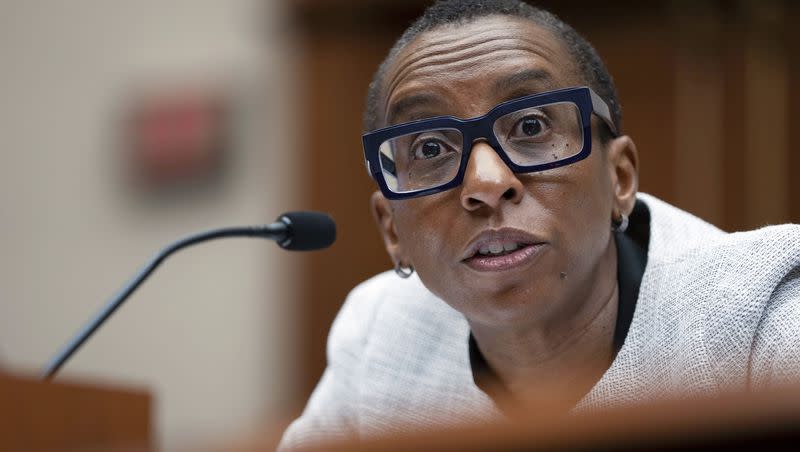Harvard President Claudine Gay resigns amid backlash from congressional testimony and plagiarism accusations

- Oops!Something went wrong.Please try again later.
Harvard University President Claudine Gay announced her resignation in a letter on Tuesday.
“This is not a decision I came to easily,” Gay wrote in the letter. “Indeed, it has been difficult beyond words because I have looked forward to working with so many of you to advance the commitment to academic excellence that has propelled this great university across centuries.”
Gay said she resigned “after consultation with members of the Corporation.”
The campus paper known as The Harvard Crimson reported that “the announcement comes three weeks after the Corporation announced unanimous support for Gay after ‘extensive deliberations’ following the congressional hearing.”
Gay will return to her faculty position at Harvard.
The Harvard Corporation released a letter thanking Gay for her service as president and announced that Alan Garber, the university’s provost and chief academic officer, will step in as interim president.
Describing Gay’s decision to resign as displaying “her commitment to the institution and its mission,” the Harvard Corporation praised Gay for her contributions as a leader and an academic.
“While President Gay has acknowledged missteps and has taken responsibility for them, it is also true that she has shown remarkable resilience in the face of deeply personal and sustained attacks,” the Harvard Corporation letter said. “While some of this has played out in the public domain, much of it has taken the form of repugnant and in some cases racist vitriol directed at her through disgraceful emails and phone calls. We condemn such attacks in the strongest possible terms.”
The resignation comes as Gay has been mired in controversy over her handling of antisemitism on campus, her congressional testimony and accusations of plagiarism levied against her.
Related
The Harvard College Palestine Solidarity Committee issued a statement hours after Hamas militants entered Israel on Oct. 7 and began killing civilians, saying that Israel was “entirely responsible for all unfolding violence.”
The university’s response came on Oct. 9 and was met with criticism, including from former Harvard president Larry Summers. Summers said that the “delayed Harvard leadership statement fails to meet the needs of the moment.”
The Wexner Foundation cut financial ties with the university over its response to the Oct. 7 attack. Billionaire investor and Harvard graduate Bill Ackman has been vocally critical of Harvard and Gay.
Criticism continued following a congressional hearing.
Rep. Elise Stefanik, R-N.Y., asked Gay, “At Harvard, does calling for the genocide of Jews violate Harvard’s rules of bullying and harassment? Yes or no?”
Gay replied, “It can be, depending on the context.”
Criticism mounted after the hearing. White House spokesperson Andrew Bates released a statement after the hearing, saying, “It’s unbelievable that this needs to be said: calls for genocide are monstrous and antithetical to everything we represent as a country.”
More than 650 Harvard faculty members signed a letter urging the university to “resist political pressures that are at odds with Harvard’s commitment to academic freedom, including calls for the removal of President Claudine Gay,” according to The Washington Post.
The accusations of plagiarism came after the hearing.
The nature of these accusations generally has to do with inadequate citation. “She has not been accused of stealing big ideas, but rather of copying language in the papers of other scholars, with small changes to substitute words or phrases or to arrange them differently. Often the language in question is technical boilerplate,” The New York Times reported.
Before Gay announced her resignation, The Crimson Editorial Board defended her, saying, “A sober-minded assessment of the plagiarism charges indicates that Gay’s behavior constitutes plagiarism, but since the errors do not appear intentional, they do not warrant her resignation.”
Carol Swain, author of “Black Faces, Black Interests,” wrote an opinion article in The Wall Street Journal saying that Gay failed to credit her in two areas of her research. “Ms. Gay’s damage to me is aggravated because her early work was in the area where my research is considered seminal. Her scholarship on Black congressional representation, electoral districting and descriptive representation builds on terrain where I plowed the ground,” Swain wrote.

